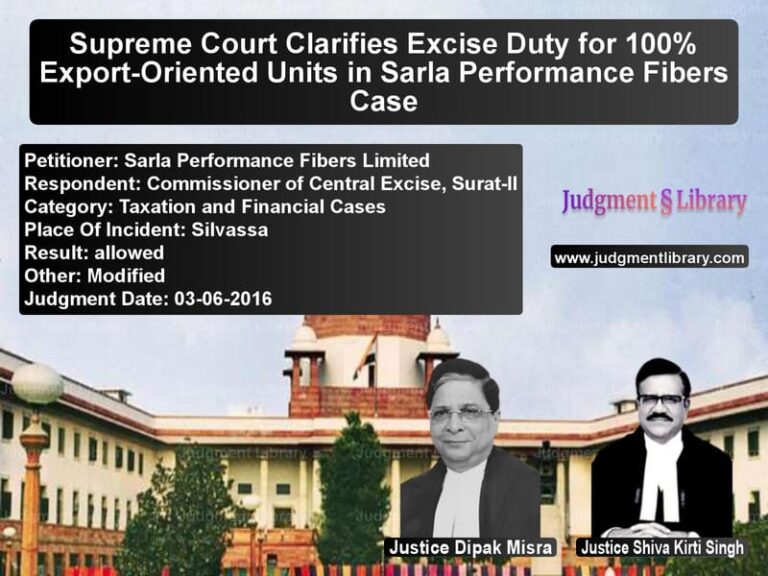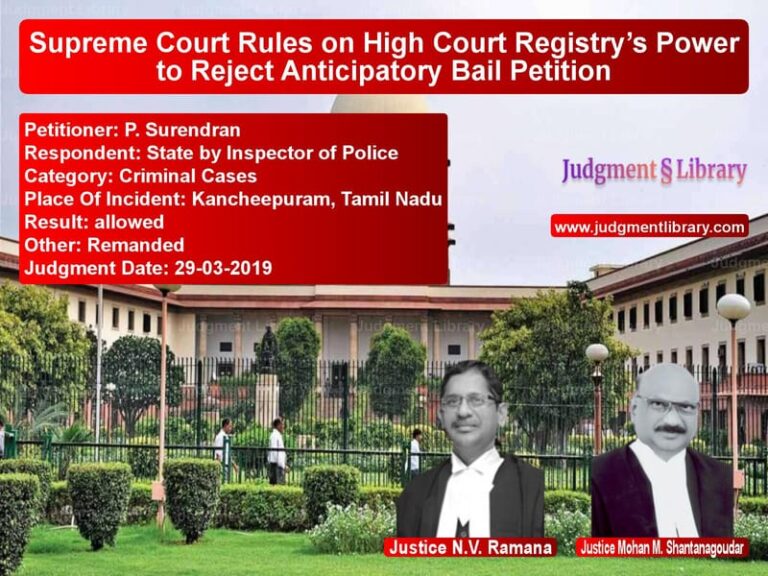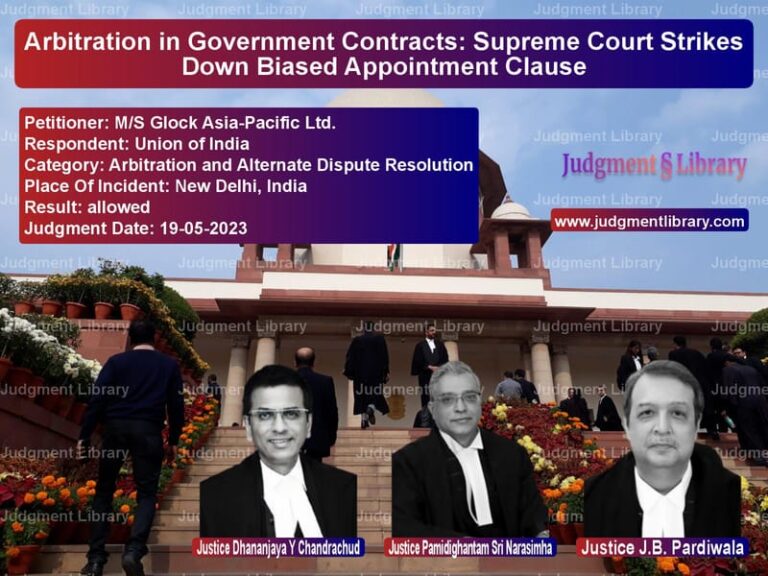Stock Appreciation Rights Taxation: Supreme Court Rules in Favor of Employee
Tax disputes often arise when there is ambiguity in the interpretation of tax laws, especially concerning compensation structures such as stock appreciation rights (SARs). The case of Additional Commissioner of Income Tax vs. Bharat V. Patel revolved around whether the redemption of SARs should be taxed as perquisite income or capital gains. The Supreme Court, in its judgment dated April 24, 2018, ruled in favor of the respondent, holding that the amount received from SARs should be treated as capital gains and not as salary perquisites.
This ruling is significant because it clarifies the tax treatment of stock appreciation rights and highlights the principle that tax laws must be applied strictly without retrospective effect. The Court also emphasized that benefits derived from employment cannot be taxed unless specifically brought under the tax net by legislative amendment.
Background of the Case
The respondent, Bharat V. Patel, was the Chairman and Managing Director of Procter & Gamble (P&G) India, a subsidiary of P&G USA. Between 1991 and 1996, P&G USA issued SARs to the respondent without any monetary consideration. On October 15, 1997, he redeemed these SARs and received an amount of Rs. 6,80,40,724. However, in his income tax return for the Assessment Year 1998-99, the respondent claimed this amount as exempt from taxation.
The Income Tax Department took the view that the amount should be taxed either as a perquisite under Section 17(2)(iii) of the Income Tax Act, 1961, or as business income under Section 28(iv). The department reassessed the respondent’s taxable income, increasing it from Rs. 40,13,820 to Rs. 7,23,11,013.
Legal Proceedings
The respondent challenged the assessment before the Commissioner of Income Tax (Appeals), who upheld the reassessment. However, upon further appeal, the Income Tax Appellate Tribunal (ITAT) ruled in favor of the respondent, holding that the SARs constituted capital assets and the amount received upon redemption should be treated as capital gains.
The Revenue Department appealed against the ITAT’s decision before the Gujarat High Court, which dismissed the appeal on December 23, 2014. Aggrieved by this decision, the department moved the Supreme Court.
Key Legal Issues
The primary questions before the Supreme Court were:
- Whether the amount received upon redemption of SARs should be treated as a perquisite under Section 17(2)(iii) of the Income Tax Act.
- Whether the transaction should be taxed as business income under Section 28(iv).
- Whether the amendment brought in by the Finance Act, 1999, introducing Clause (iiia) under Section 17(2), could be applied retrospectively to tax SARs.
Arguments by Both Parties
Petitioner’s Argument (Additional Commissioner of Income Tax):
- The amount received on redemption of SARs was a benefit derived from employment and should be taxed as a perquisite under Section 17(2)(iii).
- The respondent was an employee of P&G India, and since P&G USA controlled the subsidiary, the SARs were part of the employment compensation.
- Alternatively, the income should be taxed under Section 28(iv), which covers benefits arising from business or profession.
- The Finance Act, 1999, inserted Clause (iiia) to Section 17(2), which specifically brought stock options under the definition of perquisites. Although introduced later, it clarified the existing tax position and should be applied retrospectively.
Respondent’s Argument (Bharat V. Patel):
- The SARs were issued without any monetary consideration, making them capital assets.
- The redemption proceeds were in the nature of capital gains and not salary perquisites.
- The Finance Act, 1999, amendment was prospective and could not be applied to transactions occurring before April 1, 2000.
- The Income Tax Act does not allow retrospective taxation unless expressly provided by law.
Supreme Court’s Observations
The Supreme Court, comprising Justices R.K. Agrawal and Abhay Manohar Sapre, ruled in favor of the respondent.
Key Excerpt from the Supreme Court Judgment:
“The amount received by the respondent on redemption of Stock Appreciation Rights cannot be treated as perquisite under Section 17(2)(iii) of the IT Act as there was no employer-employee relationship with P&G USA.”
The Court further held:
“The Finance Act, 1999, introduced Clause (iiia) to Section 17(2), but the amendment was made applicable from April 1, 2000. There is no indication in the legislative intent that it should apply retrospectively.”
Final Verdict
The Supreme Court ruled:
- The Gujarat High Court’s decision in favor of the respondent was upheld.
- The amount received upon redemption of SARs should be treated as capital gains.
- The amendment introduced in the Finance Act, 1999, was prospective and could not be applied to the respondent’s case.
- The appeals filed by the Revenue Department were dismissed.
Conclusion
This judgment provides a crucial interpretation of stock appreciation rights and their taxation under Indian law. It establishes that SARs constitute capital assets and their redemption should be taxed as capital gains rather than employment income.
By ruling against retrospective taxation, the Supreme Court reaffirmed the principle that tax laws must be applied as per their clear legislative intent. This decision offers clarity to multinational companies and employees regarding the tax implications of stock-based compensation structures.
The ruling serves as a precedent for future tax disputes involving stock options, ensuring that tax authorities do not unfairly impose retrospective liabilities on employees.
Petitioner Name: Additional Commissioner of Income Tax.Respondent Name: Bharat V. Patel.Judgment By: Justice R.K. Agrawal, Justice Abhay Manohar Sapre.Place Of Incident: Ahmedabad.Judgment Date: 24-04-2018.
Don’t miss out on the full details! Download the complete judgment in PDF format below and gain valuable insights instantly!
Download Judgment: Additional Commissio vs Bharat V. Patel Supreme Court of India Judgment Dated 24-04-2018.pdf
Direct Downlaod Judgment: Direct downlaod this Judgment
See all petitions in Income Tax Disputes
See all petitions in Tax Refund Disputes
See all petitions in Tax Evasion Cases
See all petitions in Judgment by R K Agrawal
See all petitions in Judgment by Abhay Manohar Sapre
See all petitions in dismissed
See all petitions in Quashed
See all petitions in supreme court of India judgments April 2018
See all petitions in 2018 judgments
See all posts in Taxation and Financial Cases Category
See all allowed petitions in Taxation and Financial Cases Category
See all Dismissed petitions in Taxation and Financial Cases Category
See all partially allowed petitions in Taxation and Financial Cases Category







